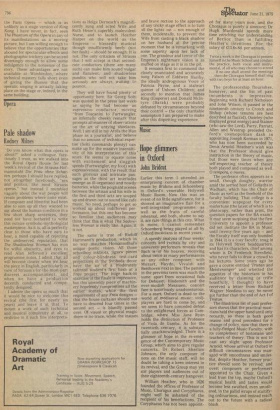Opera
Pale shadow
Rodney Milnes
_ .
"Do you know what this opera is about?" asked a colleague, facetiously I trust, as we walked into the Royal Opera House for last week's revival of the Strauss-Hofmannstahl Die Frau ohne Schatten. perhaps I should have replied, not altogether facetiously, "sex and politics, like most Strauss operas," but instead I mumbled vaguely about the way people will create problems where none exist. El composer and librettist had been able to sum up all they wanted to say about the human condition in a few short sharp sentences, they need not have bothered to write this outsize symbolic-mythological masterpiece. As it is, all is perfectly clear to those who have ears to hear, a mind capable of rejecting the undeserved reputation that The Shadowless Woman has won for wilful obscurity, and eyes to read Alan Jefferson's excellent programme notes. I admit that all will become clearer when we hear the piece in English, particularly in view of Strauss's for-the-most-part discreet accompaniment, and when we have a production decently conducted and competently designed.
I admire the opera so much that it would be nice to welcome this revival (the first for nearly six years) and leave it at that. To mount a work of such technical and musical complexity at all, to enshrine in it such fine interpreta
tions as Helga Dernesch's magnificently sung and acted Wife and Ruth Hesse's superbly malevolent Nurse, and to launch Heather Harper on the world as the Empress — blessedly musical though insufficiently beefy (not her fault) — should be enough. It is not. The only criticism of Strauss that I will accept is that secondrate conductors (there are many such) can make him sound vulgar and flatulent, and shadowless pundits who will not take him seriously are always waiting to pounce.
They will have found plenty of opportunity here. Sir Georg Solti was quoted in the press last week. as saying he had become an espressivo conductor, moving 'from Toscanini to Furtwangler, an infernally cheeky remark that prompts all manner of observations on the art of untying shoelaces. Well, I am still in my Attila the Hun phase as a journalist, and believe that no amount of technical expertise (Solti commands plenty) can make up for the massive insensitivity of his interpretation of this score. He seems to equate noise with excitement and sluggish speeds (Furtwangler, my foot) with expressiveness, with the result that such glorious and intricate passages as the third act interludes emerge as ill-organised and rowdy batteries, while the poignant scenes between the artisan and his wife in the first and third acts are souped up and drawn out to sound like cafe music. No need, perhaps to get so worked up about indifferent performance, but this one has become so familiar that audiences may think that this is what The Sadowless Woman is really like. Again, it is not.
The same is true of. Rudolf Hartmann's production, which in no way matches Homannsthal's unique poetic vision. All those schoolboy inkblots, jigsaw pieces and colour-blindness test-card prOjectionS in the SVoboda decor have the air of a— Moderately talented Student's first; bash at a Frau 'project. The huge back-lit staircase of the finale is impressive, but this unwieldy piece of machinery hopelessly•ComPrornises all the earlier scenek, • while 'the first requirement Of any Froful designs — that the house curtains should not have to descend four times in the second act — is blandly passed over. Of visual or physical magic there is no trace, while the instant
and brave rection to the approach of any tricky stage effect is to turn all the lights out — not enough of them, incidentally, to prevent the Wife from casting a black shadow on her husband at the precise moment that he is remarking with some asperity upon her lack of one. The grandeur and terror of the Empress's, nightmare vision is as muffed on stage as it is in the pit.
It remains first to commend the clearly enunciated and accurately sung Faison of Eiddwen Harihy, the ideally androgynous Voice ot Patricia Payne, and a stalwart quintet of Unborn Children; and secondly to mention that James King (Emperor) and Donald McIntyre (Barak) were probably defeated by circumstances beyond their control — the only charitable assumption I am prepared to make after this dispiriting experience.


































 Previous page
Previous page